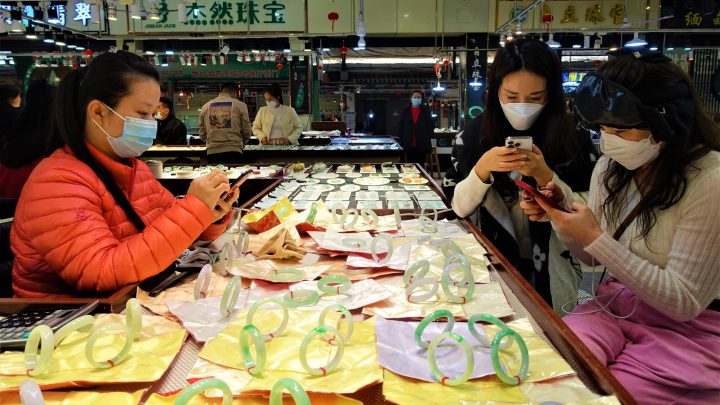
In China’s most locked-down city, business can resume but recovery is a long way off
In China’s most locked-down city, business can resume but recovery is a long way off

In the southwestern Chinese city of Ruili on the border with Myanmar, the Jiegao jade market has rows of tables for vendors stretching as far as the eye can see.
Much of the jade is from Myanmar. It is refined into jewelry and ornaments in Ruili, which is located in Yunnan province.
Myanmar trader Kyaw Naing sells only jade bracelets at his station. He is flanked by empty tables and few customers.
“Business has been so-so,” he said, but added that he is happy to be able to work.
Ruili is known as a hub for trading jade. Over 70,000 people work in the sector, according to local reports. But since the COVID-19 pandemic, the city has gained a new claim to fame; it has had more lockdowns than almost any other place in China.
That’s partly because Ruili shares a porous border with Myanmar stretching 100 miles, and Chinese authorities were worried about infected people crossing into China. That worry was heightened by increasing numbers of people coming from Myanmar to escape the civil war there.
“Over the past three years, my condo has been locked down 20 times,” jade bracelet trader Dong Baolai said. The lockdowns sometimes lasted for weeks, she said. “I was going out of my mind. I wasn’t sure how much longer I could take it.”
Dong’s family had to scramble for food. Plus, courier services were cut. She could not send jade bracelets to clients.
“During the pandemic, I had to sell my car to pay the mortgage and buy food,” she said.

Many people left Ruili, which reported a resident population of 268,000, excluding foreigners, in 2020. The local government has not updated the figure in the last two years. Population figures provided by local media — which included foreigners and short-term workers — suggest anywhere from 100,000 to 200,000 people left the city during the pandemic.
In January, Chinese government media reported that the border with Myanmar had reopened after more than 1,000 days.
However, Myanmar native and jade trader Zhao Jiaran said the vendors around him who had all gone back to Myanmar cannot return.
“China will allow us to leave and return now, but it is Myanmar blocking us from coming back, unless we come from the [Myanmar towns of] Muse or Namhkam,” he said.
At the Ruili border checkpoint, a Chinese officer confirmed to a few Myanmar workers that they could leave China but it was uncertain whether they could then return.
It is not clear why Myanmar has not fully reopened its side of the border.

In 2019, before the pandemic began, the Ruili border checkpoint saw people pass through 16.7 million times, according to China’s official statistics.
Now, however, without people flowing across the border, parts of the city feel like a ghost town. Block after block, stores lie dark behind grey metal shutters.
Many residents are hopeful Ruili will bounce back.
“Ruili still has one of the most complete supply chains for jade in China,” Zheng Hui, who runs a team that helps suppliers from Myanmar and China to sell jade through livestreaming on social media platforms, he said.
“It may take 12 to 18 months [for the industry] to recover,” Zheng said.
But it really depends on the customers, he said. “People don’t have much money after three years of lockdowns and things like jade are luxury items”.

At the same time, costs are going up for vendors. Jade seller Pan Xingsheng sells via social media platforms like Kuaishou, TikTok and its Chinese sister site, Douyin.
“Now, we have to buy traffic or there won’t be visitors to my livestream. To have my channel promoted per livestream session costs about $700,” Pan said.
His sales need to reach double that amount in every livestream session just to cover his costs.
At noon, some two dozen vendors line up at the front of the jade market.
“We’re waiting for a free boxed lunch,” one woman said. “Because of COVID, we’ve been locked down for ages, and we haven’t been able to lay out our stalls for two years. Now, the building management is trying to lure vendors back by making it easy for us to find food.”
Many of the restaurants nearby have not reopened. A local report said 1,000 meals were handed out every day. Not only is the market offering vendors a free lunch, but it is also giving them free rent for the year.

Back inside the Jiegao jade market, vendor Pan gets ready to livestream. Once he starts, he will go for eight hours without taking bathroom breaks.
How can he manage that? “Because I need to earn money. Money is my biggest motivator,” Pan said.
He really needs money because the lockdowns meant he couldn’t trade in Ruili. The interruption to his business ended up costing him about $73,000.
Additional research by Charles Zhang.
There’s a lot happening in the world. Through it all, Marketplace is here for you.
You rely on Marketplace to break down the world’s events and tell you how it affects you in a fact-based, approachable way. We rely on your financial support to keep making that possible.
Your donation today powers the independent journalism that you rely on. For just $5/month, you can help sustain Marketplace so we can keep reporting on the things that matter to you.











